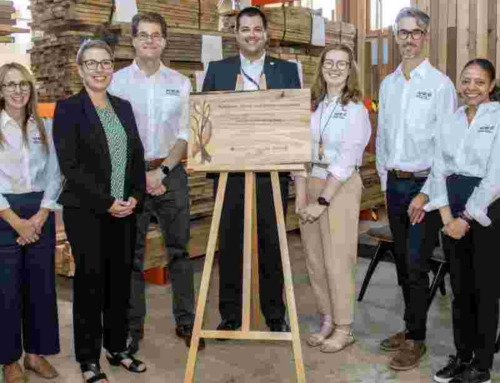Launceston to welcome new NIFPI
MEDIA RELEASE
2 May 2022
The University of Tasmania in Launceston will be home to a trailblazing new National Institute for Forest Products Innovation (NIFPI) that will position Australia as a world leader in timber and wood fibre R&D after the Federal Labor Party matched the Coalition’s $100 million pledge.
Prime Minister Scott Morrison, Assistant Minister for Forestry and Fisheries, The Hon Jonno Duniam, and Member for Bass Bridget Archer came out first three weeks ago, announcing that a re-elected Coalition Government will deliver $100 million over five years for the NIFPI, to be headquartered at the University of Tasmania in Launceston. The announcement followed a detailed feasibility study by the Federal Government through the latter half of last year.
Last week at the Australian Forest Products Association’s (AFPA’s) National Forest Industries Election Forum, Shadow Minister for Agriculture, The Hon Julie Collins confirmed that Federal Labor would also back the NIFPI with a $100 million commitment over five years.
University of Tasmania Vice-Chancellor Professor Rufus Black said the NIFPI would support a future where forestry can make its critical contribution to meeting the challenges of climate change.
“It will enable us to build buildings that are carbon sinks and create products from wood fibre that are sustainable and circular. As evidenced by our number one ranking for Climate Action in the Times Higher Education Impact Rankings for 2022, our university is deeply committed to a sustainable and circular society and economy and wood has a big part in that future.”
AFPA Chief Executive Officer Ross Hampton said the new NIFPI will be the biggest boost in forest industries research and development in decades, with industry to provide additional funding and in-kind support on top of the $100 million.
“Government investment in forest industries research has been in free fall in our nation, with the number of dedicated researchers plummeting from more than 700 to a couple of dozen in the last twenty years,” Ross Hampton said.
“As the globe pivots sharply to fibre-based materials to replace plastics and for timber to play a much larger role in high-rise construction, we risk missing out on the enormous opportunities ahead without a vibrant cohort of researchers. The NIFPI is the chance for us to turn that around and secure our place as one of the world’s powerhouse forestry nations delivering climate change solutions across the economy and our everyday lives.”
The new NIFPI will build on the success of three pilot NIFPI centres – in Launceston, Mount Gambier in South Australia and in Victoria’s Gippsland – which were jointly funded by the Federal Government, state governments and industry.
















